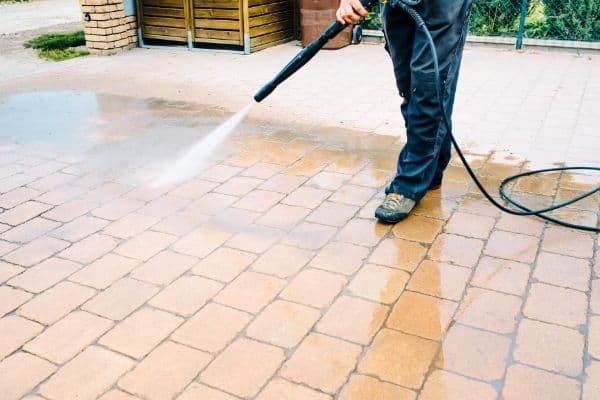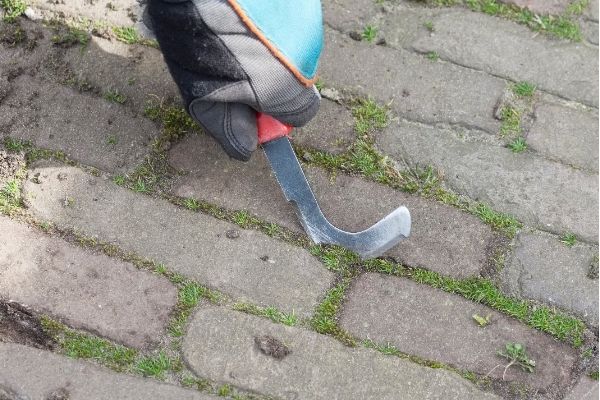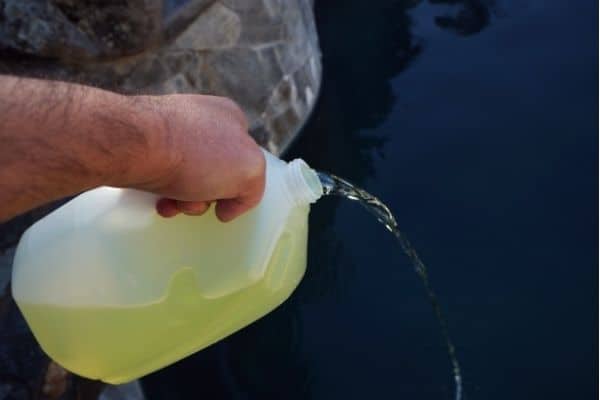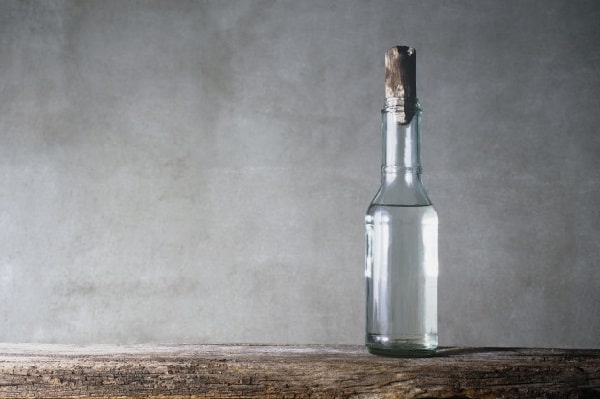Learn these tips for cleaning pavers with chlorine, vinegar, and baking soda to make your patio and walkway look superb again!

Over time, moss and weeds make concrete slabs and pavers unsightly. Therefore, they should be cleaned regularly. But the longer a path and the larger the patio, the more work is behind it.
However, with a few aids such as chlorine, vinegar, or baking soda, the pavers can be cleaned quickly again. It makes sense to carry out the procedure annually so that there is no severe soiling in the first place.
High-Pressure Cleaner: A Bad Idea
Even if it does its job quickly, the high-pressure cleaner is not suitable for concrete slabs and concrete pavers.

This is because the concrete blocks have a surface texture that consists of many pores. These are absorbent and can go deep below the surface. This is an advantage in rain and wet because no water puddle forms on the surface.
But, it is precisely this large-pored surface that is crucial for cleaning. There are the following reasons that speak against a high-pressure cleaner for concrete slabs and pavement:
- The high pressure can destroy the structure.
- As a result, water can no longer be absorbed by the paver.
- This promotes a high risk of slipping in the long run.
Using a Grout Scraper

There are joints between the concrete slabs and paving stones, in which there are weeds that like to spread, as it has good conditions to grow here. Therefore, the joints must be scraped out in the first step. The procedure is as follows:
- Move the grout scraper between the joints.
- Remove grass, weeds, and moss in this way.
- Sweep the surface well after scraping it out.
Cleaning Pavers with Chlorine
Chlorine can also help against moss and weeds. A commercially available chlorine cleaner is used for this, but it is not very environmentally friendly.

It is important that the cleaner is diluted well with water and distributed over the entire surface to be cleaned. A broom can be used for this. The diluted solution must now take effect for a while. Heavy stains can also be worked on with a broom or brush.
However, the following should also be taken into account when cleaning:
- Chlorine is very aggressive.
- Do not let the solution get onto the skin. Therefore, wear sturdy shoes, gloves, and long-sleeved, old clothes.
- Chlorine can cause stains. Perform even cleaning, otherwise, there will be bright spots on your paver.
- Apply the solution to the stones only. Do not let it get into the adjoining garden.
Cleaning Pavers with Vinegar
A solution of vinegar and water can be used to counteract the green surface on terraces and paths.

Since vinegar is a very effective solution against weeds and moss, the joints do not have to be worked on beforehand. This is because when the solution is poured onto the surface and between the joints, it acts on the roots of the weeds by itself.
So when cleaning with vinegar, the following should be done:
- Mix vinegar and water 1:1.
- Spread the solution over the entire surface and into the joints.
- Scrub well with a hard scrubber and let it take effect.
- Choose to work on a dry day because if it rains, the solution can be washed away.
- Rinse off with a hose after two days.
- The joints can also be rinsed out.
- Alternatively, sweep loose weeds and moss with a broom.
It is important that you only work on the stones to be cleaned and that the vinegar solution is not spread into the adjacent garden. This can easily happen when scrubbing hard or later when rinsing with the hose. Therefore meticulous and careful work is required here.
Cleaning Pavers with Baking Soda
Baking soda is one of the most effective cleaners when it comes to moss and weeds on the cobblestones and concrete slabs. Baking soda is available in powder form in supermarkets and drug stores.

Lye of water and baking soda is mixed from this by stirring 100 grams of baking soda into ten liters of boiling water. Depending on the area, more liquid is required. After weeds have been removed from the joints with a grout scraper, continue the cleaning process as follows:
- Protect eyes and skin. Baking soda is not entirely safe, so avoid splashes.
- Spread the baking soda mixture over the entire surface.
- Work with a rubber squeegee or broom. Every spot should be covered.
- Leave on for at least five hours.
- The mixture does not have to be removed.
Removing Oil from the Pavers
It is not only a garden path or patio covered in moss that should always be cleaned. In garage driveways or on pavers in parking spaces for the car, worse stains such as oil can also occur. These are usually stubborn and settle through the pores under the surface of the concrete slabs.
But here, too, there are effective cleaning measures to get the stains out of the slabs and paving stones:
- Absorb the fresh oil stain immediately. Cat litter can help here. Salt also soaks up the oil.
- Let it take effect and then pick it up carefully.
- Keep cleaning after removal.
- Add dishwashing liquid and scrub off lightly with a brush.
In the case of an older stain, it must first be made liquid again and vacuumed up. This can also be done with a soap solution and cat litter. Then proceed as described above.


